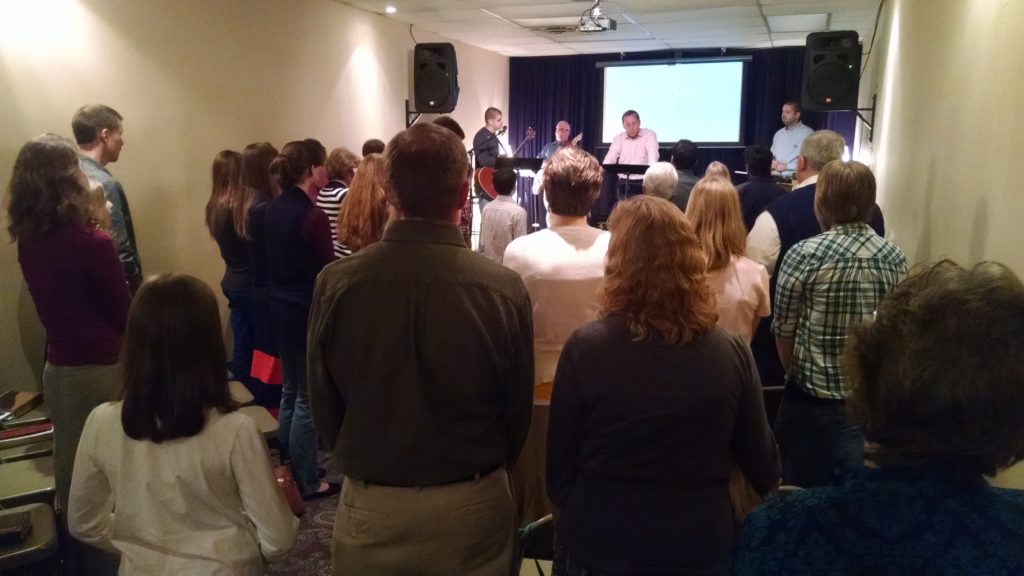How To Train Your Church Story Group
Among my acquaintances, friends and interwebz connections, I believe I’ve spotted a trend: More people are getting discouraged about promoting the reading, writing, and publishing of Christ-influenced fantastical fiction. I’ve recommended one way to fix this: We can’t skip over Jesus’s appointment of His institutional Church of churches to get His mission done — as if we need only individuals and the internet for the calling/ministry of fantastical stories.
Also, yes, many local churches are terrible, not because they’re too focused on their mission but because they confuse made-up stuff with God’s mission.1
Now — after some delay — it’s finally time to deliver on what I promised before:
Geeky fans sometimes do find a place in a local church and can begin to share the stories they love. It happened to me, anyway, and I hope to share some of my own story.
Intro: my local church
From spring 2007 to November 2013, I was an attender and then a member of Providence Community Church in Lexington, Ky.2 As a church “wanderer” before then (because reasons), I was finally able see a biblical local church born and grow and start maturing as a vibrant body.
Providence was (and is) a great option for a church home. Its teaching pastors3 explore Scripture book-by-book and verse-by-verse. They teach the biblical Gospel without moralism and without basing the “sermons” on joyless-cautionary or fluffy-inspirational anecdotes. As for the people, they are friendly and diverse in backgrounds and ages. You get the small families and large families, older empty-nesters and younger college students, and hardcore Southern Baptist Reformed theologian types and folks who care little about the “isms” and prefer reading other things.
Turns out there was plenty of place for me there: someone who enjoys studying the “isms” and semi-thick theology books, but also loves to explore and share fantastical fiction.
Both enjoyments can glorify God, though in a church you’d think theology books would get more traction. However, I was convinced that if fantastical fiction is a gift that a redeemed saint can use to worship Him, then why not worship Him together using such a gift? Was there any way to do that? I started thinking about a “new” kind of church activity …
SpecFaith goes live
Some years before Providence, my family and I attended another church: Tates Creek Presbyterian, also in Lexington. This was during the Lord of the Rings films’ theatrical releases. And two folks at that church4 were hosting a groundbreaking (for me) study about a book other than the Bible: the actual The Lord of the Rings by the actual J.R.R. Tolkien.
 The class was amazing. I remember learning so much about Tolkien along with a more-diverse class than most Sunday schools: older folks right down to middle-school kids.
The class was amazing. I remember learning so much about Tolkien along with a more-diverse class than most Sunday schools: older folks right down to middle-school kids.
Surely those fond memories inspired me to try the same at Providence. But I hadn’t done anything like this before — something you’d think a fantastical fan would not be intimidated to try.5
Yet try we did. We started with The Lion, the Witch and the Wardrobe, following the same homemade syllabus you can still find right here at SpecFaith. Next we moved to The Hobbit, timed quite well for the first film’s release date. That summer we shifted to movies, starting with the original Star Wars trilogy and then also watching and discussing The Princess Bride, WALL-E, and one of my favorites, the underappreciated The Spiderwick Chronicles.
 How to train your story group
How to train your story group
Here’s how we organized the church story groups.
- We met weekly or once every two weeks at the church. For the reading groups we met on Saturday afternoons. The final movie groups were on Sunday afternoons.
- We encouraged participants to read book chapters in advance.
- We also read chapters — or chapter selections — aloud during the reading group.
- Fun voices are optional. Acting your character is encouraged. Trade narrators often.
- Celebrity impersonations: mandatory (at least for myself, such as constantly calling dibs on the role of Aslan as he could have been portrayed by Sir Patrick Stewart).
- Don’t be awkward. No aw-shucks or nervousness! If you love these stories and know that you can use this love to help worship God with others, then show it. Even “fake” that confidence until it becomes real. And suddenly you realize you’ve leveled up.
- Prepare in advance. No I’m-just-a-nerd nervousness! If you love these stories and know you can use this love to worship God with others, then show it. Even “fake” the confidence until it becomes real. Suddenly you’ve leveled up as a Christian and a fan.
I’m no longer a member of Providence, only because in late 2013 my wife and I moved to Austin, Texas. One of these days I’ll try to start another church story group — or find new ways to encourage others to attempt starting story groups in their local churches.
Maybe then we can encourage Christians to see fantastical stories in a biblical light. Maybe then we can view them just as joyfully-seriously as we should view other gifts of God.
And maybe then — much further down the road, and further than we would have liked — we can also build up more desire among Christians for stories that beautifully and truthfully explore the fantastical wonders of God, realistic people, and amazing worlds.
Would story groups work in your church?
- If you struggle in a church that is unbiblical or ungracious, I would like to pray for you, maybe even in the comments. ↩
- Let’s name names, getting real specific and incarnational — not just “my church,” in that vague sort-of-anonymous-internet way, but with skin and proper nouns. ↩
- Biblical churches should best have more than one pastor. The role is also called a “shepherd” or “elder” in the New Testament texts. ↩
- A brainy organist and a friendly English teacher. I wish I could recall their names. ↩
- I also had limited experience leading groups or teaching classes. ↩






























I’m going to share this link with my pastor and perhaps a few others.
I’m not sure I’m ready to lead — or the church has enough interest for — a group like this. However, after reading Kerry Nietz’s post about a friend’s copy of his book being thrown away, I was reminded of fellow Christians’ doubts about fantastical tales in general and my stories in particular. Even my mother, who is one of my biggest fans (of course 😉 ), has doubts. After all, doesn’t a dragon symbolize the devil in Revelation? And ghost hunters — doesn’t researching and writing about them invite demonic spirits?
But God is greater than those fears. I don’t want to miss the adventure through the forest merely because someone else is afraid of the shadows under the trees.
I would love to do something like this. It seems like being an introverted Christian geek is a recipe for cultural isolation precisely because my primary interests of books, movies, games and writing are things that are not shared by anyone else I know on a personal/real-life level.
I go to a mega-church (Harvest Christian Fellowship in So Cal) so, at least from a statistical standpoint, I know I can’t possibly be the only one who’s oriented as I am, but the mega-church brings a great deal of challenges all it’s own. We have no shortage of space or resources but starting a group or getting permission to do something like this isn’t as simple as calling the head pastor.
My original idea several months ago was actually to start a writing group, but this seems like something that may be more feasible. I suppose my biggest hang-up with it at the moment is that I don’t feel like I’m ready or qualified to lead something like this, even if it’s only 5 people. In addition, while I love to read and explore stories, I don’t know that I’d be able to come up with a syllabus that wasn’t terrible.
I don’t know. It would be awesome, but I’m not convinced of my qualifications or (frankly) motivations.
Introverted geek Christian is a very rough combination. Any two is bad enough on its own (though I’m not sure if there is ‘extroverted geek Christian’), but I second Ty.
My church (attendance 120ish) has been between pastors for over a year and a half, so that presents its own problems, but I am so tired of the only things in the church bulletin being youth events and marriage-support things.
“Mawwidge. Mawwidge is what we all muwst desire most fewewentwee.”
I’m with Ty. I am blessed with a very “geeky” church, we have Trekkies, Whovians, comic nerds, Ringers, Narnians, Disneyites, and probably more, but I could imagine under the right leadership, something like this could be great.
About the closest thing that my congregation has ever put on is an anual “Sportsman’s Banquet” for hunting enthusiasts. One big difference is that inviting non-Christian family members and friends to come and hear the gospel from a guest speaker is a huge part of it. I don’t think my church would ever consider an event without outreach and evangelism, and the gospel would have to be explicitly presented.
Yeah … I’m not saying this is the case here. But some churches like to fool themselves into believing that all the little party-things they enjoy are only enjoyable if they’re done For Evangelism (wink, wink, nudge, wink).
I guess I’ll go ahead and ask — how did you work out talking to the leadership and getting approval?
Maybe I should email my pastor with a link to this post. I want to own my words and attitudes wherever I express them, even when I’m not proud of them. But pastors probably get lots of casual complaints disguised as small talk from people wanting things to be run differently.
It would be so much easier just to do something like this informally with your Christian friends, if you have any. But part of the benefit of church as a formal institution is that you don’t have to go through the burden of making friends in order to be part of something.